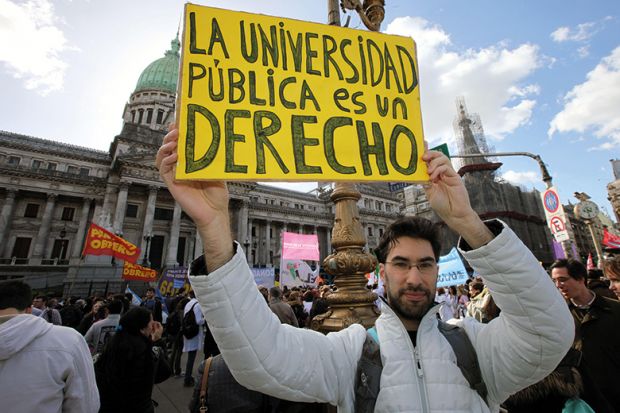The head of Argentina’s largest university has rejected calls for the introduction of tuition fees in the country, even as an economic crisis puts campus budgets under severe pressure.
Alberto Barbieri, rector of the University of Buenos Aires, told Times Higher Education that the limited government funding for his institution was “the main issue” that he had to contend with. With 320,000 students, UBA is the second-largest university in Latin America, but its budget of about $800 million (£600 million) leaves it with significantly less funding per student than many of its competitors in the region.
Such pressures are likely to increase after soaring inflation and a rapidly falling peso forced Argentina to seek a $30 billion loan from the International Monetary Fund last month.
Undergraduate courses at public universities in Argentina are free, even for international students, but the economic crisis has led many to question this approach.
However, Dr Barbieri said that he remained a “staunch defender of non-tariff” higher education.
“I came from a working-class family and was the first to graduate from university in my family,” he told THE. “I am an example of how important [it is to have] diversity of social classes in our universities.” Introducing fees would only “damage meritocracy”, he argued.
“It’s true that in Argentina the number of those living on the poverty line is high, but it’s also true that we have the largest middle class ever now in our country thanks to access to education,” Dr Barbieri added. “Our higher education system is very inclusive [and] the role of universities in integrating society is definitely one of our priorities.”
Dr Barbieri argued that UBA had still managed to be very successful, even on a tight budget: the university is well known for producing four of Argentina’s five Nobel prizewinners. But the institution still fails to appear in many international rankings tables.
Unemployment in Argentina is rife, and a shortage of graduate jobs has also raised questions about the value of the country’s higher education system, putting universities under pressure to reform courses to put them more in line with the needs of recruiters.
Dr Barbieri said that he had tried to internationalise courses and curricula, and to ensure that they keep up with technological change. This “upskilling” and constant review of labour-market needs would help the university to succeed in the tough financial times ahead, he argued.
“We are in a period of constant change,” Dr Barbieri said. “This is why I believe that the most important thing [for graduates] is to have a strong basis of knowledge to be able to change rapidly to other issues and disciplines.
“I am definitely proud of our faculty staff and our graduates because if you [compare] the low level of investment [in higher education], our results are really outstanding.”
Register to continue
Why register?
- Registration is free and only takes a moment
- Once registered, you can read 3 articles a month
- Sign up for our newsletter
Subscribe
Or subscribe for unlimited access to:
- Unlimited access to news, views, insights & reviews
- Digital editions
- Digital access to THE’s university and college rankings analysis
Already registered or a current subscriber?


